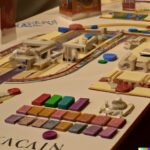Classic dice board games have remained a staple in the world of tabletop gaming, capturing the hearts of players for generations. From the ancient origins of games like Senet to modern favorites like Monopoly and Yahtzee, these classic games continue to be a beloved pastime for players of all ages. In this article, we will explore the enduring popularity and timeless appeal of classic dice board games, delving into their history, types, mechanics, and future outlook.
The history of classic dice board games is rich and diverse, spanning across cultures and time periods. These games have evolved over centuries, adapting to different societies and incorporating new elements while still retaining their core gameplay mechanics. Understanding the origins and evolution of classic dice board games provides valuable insight into their enduring appeal and widespread popularity today.
From traditional favorites like Snake and Ladders to more modern releases like Settlers of Catan, classic dice board games encompass a wide range of categories and genres. Whether it’s luck-based games that rely solely on the roll of the dice or strategy-focused titles that require careful planning and decision-making, there is a classic dice board game for every type of player.
In the following sections, we will explore the various types of classic dice board games in more detail, highlighting their unique characteristics and appeal.
History of Classic Dice Board Games
Classic dice board games have a rich and fascinating history that dates back to ancient civilizations. These games have been enjoyed by people for centuries, providing endless entertainment and fun for players of all ages. Here is an overview of the origins and evolution of classic dice board games:
- Ancient Origins: Dice games have been around for thousands of years, with evidence of their existence found in archaeological digs from ancient Egypt, Mesopotamia, and China. These early versions of dice games were often used for gambling or divination purposes, reflecting the cultural significance and widespread appeal of these games.
- Medieval Europe: Dice board games became increasingly popular in medieval Europe, with some well-known games like backgammon gaining prominence during this time. These games were often played by nobility and commoners alike, leading to their widespread adoption across different social classes.
- Modern Evolution: The 20th century saw the rise of classic dice board games as we know them today, with iconic titles like Monopoly, Yahtzee, and Clue becoming household names. These games have stood the test of time and continue to be beloved by players around the world.
The evolution of classic dice board games reflects the enduring appeal and adaptability of these timeless pastimes. From their ancient origins to their modern iterations, classic dice board games continue to capture the hearts and minds of players everywhere. Whether you’re a history buff or a gaming enthusiast, exploring the origins of classic dice board games offers valuable insight into their enduring popularity.
Types of Classic Dice Board Games
Classic dice board games come in a variety of categories, each offering a unique gaming experience. One of the most popular categories is traditional games, which includes classics like Monopoly, Scrabble, and Yahtzee. These games have been enjoyed by generations and continue to be widely played today due to their timeless appeal. Traditional games often involve strategic decision-making, luck, and competition, making them perfect for game nights with family and friends.
In addition to traditional games, there are also newer releases that have gained popularity in recent years. Euro-style board games, such as Settlers of Catan and Ticket to Ride, have become increasingly popular among gamers for their emphasis on strategy and resource management. These newer releases often feature innovative game mechanics and engaging themes that appeal to a wide range of players.
Finally, another category of classic dice board games includes party or social deduction games. Examples of these include Codenames and Secret Hitler. These games are designed to encourage interaction and socialization among players through teamwork or deception. With their fast-paced gameplay and emphasis on player interaction, party games are perfect for gatherings or events with larger groups.
Overall, classic dice board games offer something for everyone, whether you prefer traditional favorites like Monopoly and Yahtzee or newer releases with innovative mechanics. The diverse categories ensure that there is always a classic dice board game suited to your preferences and playstyle.
| Category | Examples |
|---|---|
| Traditional Games | Monopoly, Scrabble, Yahtzee |
| Euro-style Board Games | Settlers of Catan, Ticket to Ride |
| Party/Social Deduction Games | Codenames, Secret Hitler |
Game Mechanics
Classic dice board games have been a staple in the gaming world for centuries, providing endless entertainment and strategic challenges for players of all ages. Understanding the basic rules and mechanics of these games is essential for playing and enjoying them to the fullest. Here are some key aspects of game mechanics in classic dice board games:
- Use of Dice: Classic dice board games heavily rely on the use of dice to determine movement, outcomes, or actions within the game. Whether it’s rolling a pair of dice in Monopoly to move around the board or strategically using dice combinations in Yahtzee to score points, the element of chance adds excitement and unpredictability to these games.
- Objectives: Each classic dice board game has its own unique set of objectives that players must strive to achieve in order to win. For example, in Sorry., the objective is to be the first player to move all four of their pawns from Start to Home by drawing special cards and strategically navigating obstacles on the game board.
- Rules: Understanding the specific rules governing gameplay is crucial for success in classic dice board games. Whether it’s abiding by property purchase rules in Monopoly or following scoring combinations in Yahtzee, having a firm grasp of the game’s rules enhances the overall experience and competitiveness.
Mastering these fundamental game mechanics not only improves gameplay but also fosters critical thinking skills and strategic decision-making among players. The next time you gather around with friends or family for a game night, keep these basic rules and mechanics in mind as you delve into the timeless world of classic dice board games.
Strategy and Skills
Dice board games have been around for centuries, captivating players with their blend of luck and strategy. In order to excel at classic dice board games, it is important to understand the strategic elements and skills required to triumph over opponents. From decision-making to risk assessment, these games test a player’s ability to think critically and adapt to various scenarios.
Decision-Making
One of the key skills required to succeed in classic dice board games is effective decision-making. Players must weigh the potential risks and rewards of each move, considering factors such as resource management, timing, and long-term goals. Whether it’s choosing which properties to invest in Monopoly or deciding when to use certain combinations of dice in Yahtzee, the ability to make sound decisions can greatly impact a player’s success.
Risk Assessment
Classic dice board games often involve an element of chance, as players rely on the roll of the dice to determine their fate. However, skilled players are able to assess and manage these risks effectively. Understanding the probabilities of different outcomes can inform a player’s strategy, helping them make calculated decisions that minimize their exposure to potential setbacks while maximizing their chances of success.
Adaptability
Another important skill for excelling at classic dice board games is adaptability. As the game progresses, players must be prepared to adjust their strategies based on changing circumstances and rival moves. This may involve pivoting from an initial plan, capitalizing on opportunities that arise, or responding strategically to setbacks. The ability to stay flexible and adapt one’s approach in response to evolving game dynamics is crucial for achieving victory in these timeless games.
By honing these strategic elements and skills, players can elevate their gameplay in classic dice board games and increase their chances of success during family game nights or competitive gaming sessions with friends.
Classic Dice Board Games for Families
Classic dice board games have been a staple of family game nights for generations, providing hours of entertainment and fostering quality bonding time. Whether it’s the thrill of competition or the joy of spending time together, these classic games are perfect for bringing families closer. Here are some classic dice board games that are sure to be a hit on your next family game night.
Monopoly
One of the most iconic classic dice board games, Monopoly has been enjoyed by families for decades. With its combination of strategy, luck, and negotiation, this game offers an immersive experience that can last for hours. Players roll the dice to move around the board, buying properties and collecting rent from opponents in their quest to become the wealthiest player.
Yahtzee
Yahtzee is another beloved classic dice game that is easy to learn and provides endless entertainment for players of all ages. The game involves rolling five dice to achieve certain combinations and score points. With its simple gameplay and emphasis on luck, Yahtzee is a great choice for a fun-filled family game night.
Sorry.
Sorry. is a classic race-to-home board game that has been entertaining families since the 1930s. Players use cards and dice to move their pawns around the board while trying to bump off their opponent’s pawns. The elements of chance and strategy make Sorry. an engaging choice for family game nights.
These classic dice board games are not only entertaining but also offer valuable opportunities for families to come together, communicate, and create lasting memories. With their timeless appeal and enduring popularity, these games continue to be cherished by players of all ages.
Classic Dice Board Games for Adults
When it comes to classic dice board games for adults, there are a plethora of options that provide a more complex and strategic gaming experience. Games like Risk and Axis & Allies are perfect examples of classic board games that offer deeper gameplay with intricate rules and mechanics. These types of games often require strategic planning, negotiation, and critical thinking skills, making them ideal for adult players who enjoy a more immersive and challenging gaming experience.
In addition to strategy-focused games, there are also classic dice board games with themes that are more mature and suited to adult players. Titles like Settlers of Catan and Ticket to Ride offer sophisticated gameplay with themes surrounding resource management, trade, and building civilizations or railway networks. These games appeal to adults who appreciate engaging storytelling elements and in-depth decision-making processes while playing.
Furthermore, modern iterations of classic dice board games have introduced innovative mechanics and themes that cater specifically to adult audiences. Games like Betrayal at House on the Hill and Dead of Winter incorporate elements of horror and suspense, providing a unique gaming experience that is both thrilling and intellectually stimulating. As the gaming industry continues to evolve, adult players can look forward to more diverse and compelling options in the realm of classic dice board games.
The Future of Classic Dice Board Games
In conclusion, it is clear that classic dice board games have maintained their appeal and popularity over the years, remaining a beloved pastime for people of all ages. These timeless games have stood the test of time, proving to be enduring sources of entertainment and bonding opportunities for families and friends.
As we continue to move forward in the world of gaming, classic dice board games are likely to remain a staple in many households, offering a nostalgic and enjoyable alternative to modern digital games.
Looking ahead, there is potential for innovation within the world of classic dice board games. While traditional games like Monopoly and Yahtzee may always hold a special place in our hearts, game developers have been introducing new twists on these classics, creating fresh experiences while maintaining the essence of what makes these games so beloved.
With advances in technology and game design, we can expect to see an evolution in classic dice board games that will keep them relevant and engaging for generations to come.
Ultimately, classic dice board games are here to stay. Their ability to bring people together in friendly competition or cooperative play is unmatched, making them an essential part of any game collection.
Whether enjoyed on a family game night or at a gathering with friends, classic dice board games offer timeless fun and continue to hold a special place in the modern gaming landscape. As we move forward into the future, it’s certain that these beloved games will remain an integral part of our gaming culture.
Frequently Asked Questions
What Games Traditionally Use Dice?
Many traditional board games and tabletop games use dice as a fundamental component of gameplay. Some examples include backgammon, craps, Yahtzee, Farkle, and various role-playing games like Dungeons & Dragons.
What Is the Most Common Dice Game?
The most common dice game is arguably “Yahtzee.” This classic game involves rolling five dice to achieve specific combinations for points, and it has remained popular since its creation in the 1950s. Its simple yet engaging gameplay makes it a favorite among both casual and serious gamers.
What Is the Oldest Board Game With Dice?
The oldest board game with dice is believed to be “Senet,” an ancient Egyptian game dating back as far as 3100 BC. The game involved using dice or casting sticks to move pieces along a board, making it one of the earliest known board games in history.
Senet has cultural and religious significance in ancient Egypt and was played for over 2,000 years.

I love playing all kinds of games – from classics like Monopoly to modern favourites like Ticket to Ride.
I created this blog as a way to share my love of board games with others, and provide information on the latest releases and news in the industry.





